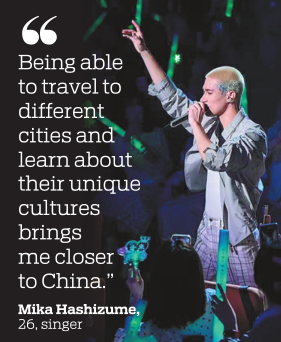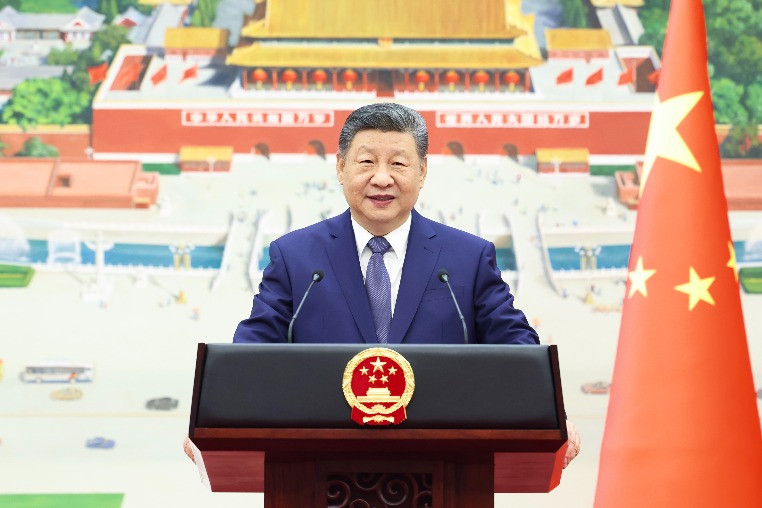Pop idol wins new fans in China
Sultry voice gives star a distinctive sound and hordes of appreciative audience, Xing Wen reports.

Adecade ago, Hawaiian teen Mika Hashizume's mornings often began with predawn hikes to volcanic summits to watch the sun ignite the Pacific in liquid gold, followed by breakfast, surfing sessions and then soccer matches with friends under swaying palms in the afternoon.
"I never really thought about my future," says Hashizume, now 26, recalling the care-free adolescence.
Now, half a world away, the same person who measured time in sunrises counts it in sold-out theaters across China. Fluent in Mandarin, he headlines nationwide concerts, releases bilingual albums, represents fashion powerhouses like Burberry and Tiffany & Co., and commands runways at fashion weeks in Paris, New York, Milan and London.
It was his decision to compete in the Chinese talent show Chuang 2021 four years ago that propelled Hashizume to stardom in a country so distant from his island home.
At 18, Hashizume, an American Japanese, moved to Tokyo after being scouted by a Japanese entertainment agency, where he balanced his studies with vocal and stage performance training. The next year, he debuted as a member of the Japanese boy band Intersection.
In 2021, when Tencent Video launched Chuang 2021, a talent show aimed at forming a multinational boy group, Hashizume — along with two of his bandmates, Caelan Moriarty and Kazuma Mitchell — decided to take the chance.
"It was a real big opportunity for me because I think, at that point, I never had that much recognition in my career," Hashizume recalls.
Though he spoke no Chinese at the time, his heartthrob looks, islander ease, and sultry voice won over fans, ultimately securing him a spot in the final lineup of the 11-member boy group INTO1.
"It gave me an opportunity to move to China and gain audience not only in China, but in other countries as well. So, I think that was definitely a significant point in my career," he says.
After INTO1 disbanded in April 2023, Hashizume pursued a solo career, releasing Chinese cover songs and bilingual original tracks.
"I actually really like being here and I wanna keep on doing this," he says.
"Definitely, the opportunity here is very different from the opportunities I would have in America, just because I think that I'm very different in this industry. And I try to use that edge as my factor to move forward and up."
He adds that his exposure to the Chinese music industry introduced him to countless new songs and genres he had never encountered while growing up, adding that he particularly gravitates toward slower, ballad-style pop.
"It has definitely opened up a whole new genre and a whole new way of writing and singing music," he says.
For instance, he notes that the signature falsetto-chest voice transitions in Chinese pop hooks has helped him better understand how to better use his falsetto technique.
He also highlights the cinematic nature and frequent use of orchestral elements in Chinese pop music, as well as the uniquely poetic density of metaphors in Chinese lyrics — a distinctive artistic trait rarely seen in Western music.
Personally, as someone who grew up in diverse cultures, Hashizume prioritizes melody and sound over language barriers. He approaches singing as though playing an instrument, focusing on his voice's musicality rather than its lyrical quality to forge cross-cultural connections with listeners.
Hashizume launched the Pretty Lies Tour 2025 earlier in the year, which took him to various cities including Haikou in Hainan province, Shenzhen in Guangdong province, Xi'an in Shaanxi province and Weifang in Shandong province this spring.
During each stop, he sampled local delicacies and explored the culture.
In Weifang — where the local kite-making skills were included in the first batch of the National Intangible Cultural Heritage representative projects list in 2006 — he experienced the kite-making process. He joined thousands of people flying kites of various shapes and sizes at the 42nd Weifang International Kite Festival.
"That's really new to me. Not many cities I've visited have such a unique festival and culture. So being able to learn how to make a kite and also to see that many kites in one area was really cool," he says.
In Xi'an, Hashizume brought his American father for his first China visit. They explored the Terracotta Warriors and savored authentic local delicacies such as biangbiang noodles and roujiamo (Chinese meat sandwich).
"Being able to travel to different cities and learn about their unique cultures brings me closer to China. That's definitely the highlight of every tour for me," says Hashizume.
Now, across the vast expanse of this country far from his home island, he consistently finds ways to maintain his once-outdoorsy lifestyle: jogging through the parks in Beijing where he's resided for four years, playing mahjong in Chengdu, Sichuan province, pedaling a tricycle along Hong Kong's seaside trails, trekking across the grasslands in the Xinjiang Uygur autonomous region, and scaling snow-capped mountains in the Inner Mongolia autonomous region.
He has visited nearly 30 Chinese cities so far, and at each stop he immerses himself in local culture and cuisine while documenting his experiences through vlogs.
"Through his vlogs, you can see how he embraces local cultures as a foreigner — with such open-mindedness and sincerity that we naturally want to embrace him back," says Zhang Meilin, a devoted fan from Urumqi, Xinjiang's regional capital.



Today's Top News
- Beijing accuses Manila of trying to smear China's actions in the South China Sea
- Scientists using Chinese telesecope capture evolutionary process of mysterious flashes
- Xi: Advance building of China-Canada new strategic partnership
- Xi receives credentials of new ambassadors to China
- China's giant radio telescope observations unravel origin of cosmic enigmatic flashes
- Xi meets Canadian prime minister






























